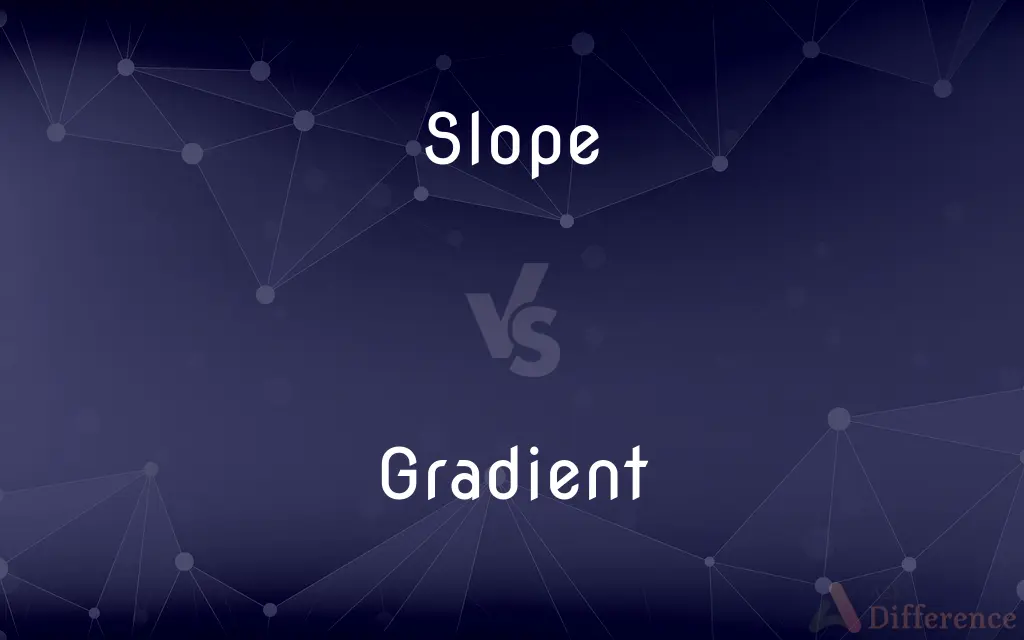Slope vs. Gradient — What's the Difference?
By Tayyaba Rehman — Updated on October 23, 2023
"Slope" refers to the incline or decline of a surface, while "Gradient" specifically denotes the rate or degree of that incline, often mathematically expressed.

Difference Between Slope and Gradient
Table of Contents
ADVERTISEMENT
Key Differences
Both "Slope" and "Gradient" deal with the concept of inclination. "Slope" is a more general term that describes the tilt or slant of a surface. It can be used in everyday contexts, like when discussing the slope of a hill or roof. This term doesn't necessarily convey the exact degree or measure of the incline, but rather its existence.
"Gradient," on the other hand, carries a more specific meaning. It's often used in mathematical and scientific contexts to describe the rate at which one quantity changes relative to another. In the context of surfaces, the gradient would indicate how much vertical change occurs over a given horizontal distance.
Another key distinction is that while "slope" can simply refer to the presence of an incline, "gradient" typically involves a measure or calculation. In mathematics, especially in coordinate geometry, the gradient of a line is calculated as the "rise" over the "run."
Furthermore, "gradient" is not exclusive to describing physical inclines. It can also refer to variations in other quantities, such as temperature or pressure gradients in scientific contexts. In contrast, "slope" is more commonly associated with tangible inclinations of surfaces or landscapes.
Comparison Chart
Definition
Incline or decline of a surface
Rate or degree of an incline, often mathematically expressed
ADVERTISEMENT
Usage
General contexts, physical inclines
Mathematical/scientific contexts, rate of change
Examples
Slope of a hill, roof
Gradient of a line, temperature gradient
Associative Concepts
Tilt, slant
Rise over run, rate of change
Broader Application
Primarily physical inclines
Can refer to any variation, like temperature or pressure gradients
Compare with Definitions
Slope
In mathematics, the slope or gradient of a line is a number that describes both the direction and the steepness of the line. Slope is often denoted by the letter m; there is no clear answer to the question why the letter m is used for slope, but its earliest use in English appears in O'Brien (1844) who wrote the equation of a straight line as "y = mx + b" and it can also be found in Todhunter (1888) who wrote it as "y = mx + c".Slope is calculated by finding the ratio of the "vertical change" to the "horizontal change" between (any) two distinct points on a line.
Gradient
A graduated scale or measure of difference.
The color gradient on the canvas was subtle.
Slope
The inclined surface of a hill or terrain.
The slope of the mountain is steep.
Gradient
In mathematics, the rise over run of a line on a graph.
The line's gradient is calculated as the vertical change divided by the horizontal change.
Slope
A surface that lies at an angle to the horizontal.
Skiers navigated the snowy slopes.
Gradient
In vector calculus, the gradient of a scalar-valued differentiable function f of several variables is the vector field (or vector-valued function) ∇ f {\displaystyle \nabla f} whose value at a point p {\displaystyle p} is the vector whose components are the partial derivatives of f {\displaystyle f} at p {\displaystyle p} . That is, for f : R n → R {\displaystyle f\colon \mathbb {R} ^{n}\to \mathbb {R} } , its gradient ∇ f : R n → R n {\displaystyle \nabla f\colon \mathbb {R} ^{n}\to \mathbb {R} ^{n}} is defined at the point p = ( x 1 , … , x n ) {\displaystyle p=(x_{1},\ldots ,x_{n})} in n-dimensional space as the vector: ∇ f ( p ) = [ ∂ f ∂ x 1 ( p ) ⋮ ∂ f ∂ x n ( p ) ] .
Slope
The direction or manner of incline.
The slope towards the river is gradual.
Gradient
A rate of inclination; a slope.
Slope
An upward or downward slant.
Adjust the slope of the ramp for easier access.
Gradient
An ascending or descending part; an incline.
Slope
A surface of which one end or side is at a higher level than another; a rising or falling surface
He slithered helplessly down the slope
Gradient
(Physics) The rate at which a physical quantity, such as temperature or pressure, changes in response to changes in a given variable, especially distance.
Slope
A person from East Asia, especially Vietnam.
Gradient
(Mathematics) A vector having coordinate components that are the partial derivatives of a function with respect to its variables.
Slope
(of a surface or line) be inclined from a horizontal or vertical line; slant up or down
The garden sloped down to a stream
The ceiling sloped
Gradient
(Biology) A series of progressively increasing or decreasing differences in the growth rate, metabolism, or physiological activity of a cell, organ, or organism.
Slope
Move in an idle or aimless manner
I had seen Don sloping about the beach
Gradient
A slope or incline.
Slope
To diverge from the vertical or horizontal; incline
A roof that slopes.
Gradient
A rate of inclination or declination of a slope.
Slope
To move or walk
"Without another word he turned and sloped off down the driveway" (Roald Dahl).
Gradient
The ratio of the rates of change of a dependent variable and an independent variable, the slope of a curve's tangent.
Slope
To cause to slope
Sloped the path down the bank.
Gradient
(science) The rate at which a physical quantity increases or decreases relative to change in a given variable, especially distance.
Slope
An inclined line, surface, plane, position, or direction.
Gradient
A differential operator that maps each point of a scalar field to a vector pointed in the direction of the greatest rate of change of the scalar. Notation for a scalar field φ: ∇φ
Slope
A stretch of ground forming a natural or artificial incline
Ski slopes.
Gradient
A gradual change in color. A color gradient; gradation.
Slope
A deviation from the horizontal.
Gradient
Moving by steps; walking.
Slope
The amount or degree of such deviation.
Gradient
Rising or descending by regular degrees of inclination.
The gradient line of a railroad
Slope
The rate at which an ordinate of a point of a line on a coordinate plane changes with respect to a change in the abscissa.
Gradient
Adapted for walking, as the feet of certain birds.
Slope
The tangent of the angle of inclination of a line, or the slope of the tangent line for a curve or surface.
Gradient
Moving by steps; walking; as, gradient automata.
Slope
Offensive Slang Used as a disparaging term for a person of East Asian birth or ancestry.
Gradient
Rising or descending by regular degrees of inclination; as, the gradient line of a railroad.
Slope
An area of ground that tends evenly upward or downward.
I had to climb a small slope to get to the site.
A steep slope
Gradient
Adapted for walking, as the feet of certain birds.
Slope
The degree to which a surface tends upward or downward.
The road has a very sharp downward slope at that point.
Gradient
The rate of regular or graded ascent or descent in a road; grade.
Slope
(mathematics) The ratio of the vertical and horizontal distances between two points on a line; zero if the line is horizontal, undefined if it is vertical.
The slope of this line is 0.5
Gradient
A part of a road which slopes upward or downward; a portion of a way not level; a grade.
Slope
(mathematics) The slope of the line tangent to a curve at a given point.
The slope of a parabola increases linearly with x.
Gradient
The rate of increase or decrease of a variable magnitude, or the curve which represents it; as, a thermometric gradient.
Slope
The angle a roof surface makes with the horizontal, expressed as a ratio of the units of vertical rise to the units of horizontal length (sometimes referred to as run).
The slope of an asphalt shingle roof system should be 4:12 or greater.
Gradient
The variation of the concentration of a chemical substance in solution through some linear path; also called concentration gradient; - usually measured in concentration units per unit distance. Concentration gradients are created naturally, e.g. by the diffusion of a substance from a point of high concentration toward regions of lower concentration within a body of liquid; in laboratory techniques they may be made artificially.
Slope
A person of Chinese or other East Asian descent.
Gradient
A graded change in the magnitude of some physical quantity or dimension
Slope
(intransitive) To tend steadily upward or downward.
The road slopes sharply down at that point.
Gradient
The property possessed by a line or surface that departs from the horizontal;
A five-degree gradient
Slope
(transitive) To form with a slope; to give an oblique or slanting direction to; to incline or slant.
To slope the ground in a garden;
To slope a piece of cloth in cutting a garment
Gradient
The measure of steepness or the degree of inclination.
The gradient of the hill made cycling challenging.
Slope
To try to move surreptitiously.
I sloped in through the back door, hoping my boss wouldn't see me.
Gradient
A rate of change with respect to distance.
The temperature gradient in the room was noticeable.
Slope
(military) To hold a rifle at a slope with forearm perpendicular to the body in front holding the butt, the rifle resting on the shoulder.
The order was given to "slope arms".
Gradient
A transition from one value to another.
The gradient between light and dark shades was smooth.
Slope
(obsolete) Sloping.
Slope
(obsolete) slopingly
Slope
An oblique direction; a line or direction including from a horizontal line or direction; also, sometimes, an inclination, as of one line or surface to another.
Slope
Any ground whose surface forms an angle with the plane of the horizon.
Buildings the summit and slope of a hill.
Under the slopes of Pisgah.
Slope
The part of a continent descending toward, and draining to, a particular ocean; as, the Pacific slope.
Slope
Sloping.
A bank not steep, but gently slope.
Slope
In a sloping manner.
Slope
To form with a slope; to give an oblique or slanting direction to; to direct obliquely; to incline; to slant; as, to slope the ground in a garden; to slope a piece of cloth in cutting a garment.
Slope
To take an oblique direction; to be at an angle with the plane of the horizon; to incline; as, the ground slopes.
Slope
To depart; to disappear suddenly.
Slope
An elevated geological formation;
He climbed the steep slope
The house was built on the side of the mountain
Slope
The property possessed by a line or surface that departs from the horizontal;
A five-degree gradient
Slope
Be at an angle;
The terrain sloped down
Slope
The degree to which a surface deviates from the horizontal.
The road has a gentle slope.
Common Curiosities
What's another term for "gradient" in the context of roads?
Grade.
Is "slope" always related to geography or terrain?
No, while often used for terrain, "slope" can describe any inclined surface.
How is the "slope" of a line typically represented in math?
As "rise over run" or Δy/Δx.
What might a "steep slope" indicate?
A surface that rises or falls sharply.
In art, how is "gradient" used?
To describe a smooth transition between colors or shades.
How can you describe a flat road in terms of "slope"?
It has a zero or no slope.
Does "gradient" always require a numerical value?
Often, especially in math, but it can also describe a general transition, like in color gradients.
Can "slope" be used in mathematics?
Yes, particularly in linear equations to describe the incline of a line.
Can "slope" be used to describe intangible concepts?
Less commonly, but it's mostly used for tangible inclines.
How is "slope" different from "elevation"?
"Slope" describes the incline, while "elevation" denotes the height above a reference point.
Which term is more common in scientific contexts?
"Gradient," especially when discussing rates of change.
Can "gradient" refer to things other than physical inclines?
Yes, it can denote any rate of change, like temperature or pressure gradients.
Which is more specific, "slope" or "gradient"?
"Gradient" is more specific, often indicating a measured rate of change.
Can "gradient" be used in geography?
Yes, for example, to describe the steepness of landforms.
Is "gradient" always positive?
No, it can be negative, indicating a decline or decrease.
Share Your Discovery

Previous Comparison
Agenda vs. Schedule
Next Comparison
Brow vs. HillAuthor Spotlight
Written by
Tayyaba RehmanTayyaba Rehman is a distinguished writer, currently serving as a primary contributor to askdifference.com. As a researcher in semantics and etymology, Tayyaba's passion for the complexity of languages and their distinctions has found a perfect home on the platform. Tayyaba delves into the intricacies of language, distinguishing between commonly confused words and phrases, thereby providing clarity for readers worldwide.















































